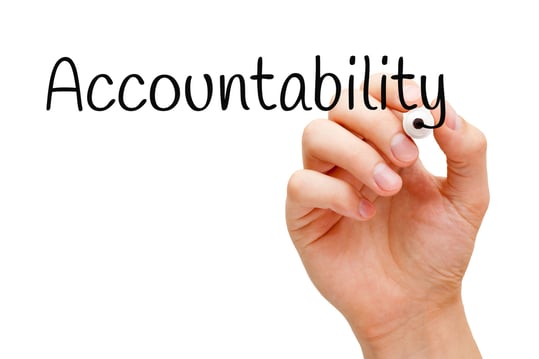Meet the New ZOLL Dispatch and ZOLL Respond CAD Solution
Defining and enforcing accountability in EMS
(6 min read) A few months back I was assisting an organization in their efforts to increase employee engagement and satisfaction

(6 min read) A few months back I was assisting an organization in their efforts to increase employee engagement and satisfaction. A dirty word kept popping up in my discussions. This “dirty word” was used by both the leaders and members of the workforce. Even though the leaders brought it up as an organizational challenge, it was actually members of the workforce that seemed to take umbrage at its use, or failure of use for that matter. The dirty word we are talking about is accountability.

When meeting with the company’s leadership team, I was told that “there is no accountability by the work force.” I immediately thought: well we know whose fault that is. When I met with the members of the workforce, a common thread was “management does not hold people accountable for their actions.”
Accountability means lots of different things to different people. On one side it outlines expectations and responsibilities, on the other side some use it when looking to punish or discipline others. So, what does accountability really mean? How do leaders make it an essential part of their leadership style? Let’s examine the components of developing a culture of accountability.
The Meaning of Accountability
Accountability is one of those words that regularly gets thrown around in the business world, but most do not know how to use it effectively. We know that being accountable is an important concept in leadership circles, but the misuse of the word without effective action undermines the importance of its true meaning. Regardless of how the word is used or misused, holding people accountable is vital for an organization to achieve successful results and high performance.
“A good definition for accountability is the commitment of a company or individual to account for their actions, accept responsibilities for those actions, and reveal the results in a transparent manner,” – Chris Cebollero, President/CEO Cebollero & Associates.
It seems easy, but for many of today’s leaders practicing accountability, it’s more verbal than actionable. Companies and individuals like to say they are accountable in nature, but when push comes to shove, it becomes a misused word.
The Barriers to Accountability
In business, leaders often know what the right thing to do is, but executing on the right thing is where the challenge arises. In organizations, there are policies, procedures and expectations. Yet, when an employee seems to have fractured those policies, it seems easier for leaders to turn the other cheek rather than engaging the employee in question and upholding the need for said policies.
In EMS we also have contractual obligations to have a certain number of ambulances on the street to meet the demand. With 4 shifts open, some leaders allow employees to get away with minor infractions, because addressing them or following the progressive disciplinary process would cause that employee to be terminated – deepening the predicament of having too many open shifts. By failing to make these employees answerable, you are signaling to your best, highest performing team members that your organization has no accountability.

High-performing employees won’t keep working for an organization that lacks accountability, so now you’ve got a retention problem. Yes, it does take courage to hold people accountable, and it is uncomfortable to enforce accountability. This skill is essential to good leadership and needs to be learned to achieve ultimate success - before those employees that are looking for their leaders to do the right thing become disillusioned when this failure occurs.
Ego is another barrier to accountability. An employee who is brought in to discuss an infraction and uses an inflated sense of self-importance as a defense mechanism, saying “you just don’t know what I have to do out here” or “you don’t understand the conditions I have to work in,” is trying to manipulate his/her way out of the situation. Leaders will often feel sorry for the person and dismiss the infraction
One of the most common mistakes in this scenario is that the leader is trying to use accountability in a punitive manner instead of focusing on coaching and helping people achieve maximum performance. When coaching is the focus, it makes no difference what conditions you work in, or how hard the person is trying, it is all about making that employee better in the long run.
Pure laziness is another barrier to practicing accountability. It takes work to meet with employees and to follow up with them. When we look to hold members of our organization accountable – using it as a coaching tool – it shows that you care about the employee. You want to be able to signal to them what they do is important to achieving the mission of the organization. If you are not willing to walk that extra mile, it may be time to reexamine if leading others is for you.
One key to effectively holding people accountable to expectations is never be negative in your approach. We can discuss accountability without making it sound like disciplinary action. This is where developing good coaching skills (a whole other article) comes into play.

Holding People Accountable
Here are some easy tips in developing your practice of holding the workforce accountable.
- When you say you are going to follow up on expectations you have to do so. Failure to follow up is a clear sign to employees that your words have no meaning.
- Be fair and consistent with accountability. You have to ensure that everyone is held to the same standard, and that you enforce it every time it needs to be done. As soon as you stop following up, it is more likely that the normalization of deviance will occur.
- It is important to hold people not only to their actions, but also to their results. It is the results of the actions that truly matter. If you do not focus on both the actions and results, you will never develop the best employee possible.
- When standards are overlooked, performance is sure to follow. For this reason, at no time are the expectations of an organization negotiable. There is nothing wrong with admitting that the results attained are not acceptable to the standards. This may be another coaching opportunity. Now, leaders may have the chance to work one-on-one with the employee and develop skills they may not have had.
- Leaders need to try their best to get the very finest out of the workforce. Holding them accountable, being committed to positive coaching, and having good communication skills are essential to making that employee successful. If guidance and mentorship does not lead to employee success, eventually it’s best to help them be successful somewhere else. High performing employees are watching how you are dealing with subpar employees, and leaders will be graded on the outcome.
When leaders use coaching as the mechanism to hold team members accountable, it signals that good employees are vital to the success of the organization, and it develops their drive to perform at the highest level possible.
Related Posts
Collect More Revenue Faster: The Pivotal Role of Clear, Concise, and Complete Documentation
ZOLL Pulse Blog
Subscribe to our blog and receive quality content that makes your job as an EMS & fire, hospital, or AR professional easier.
ZOLL Pulse Blog
Subscribe to our blog and receive quality content that makes your job as an EMS, fire, hospital, or AR professional easier.




